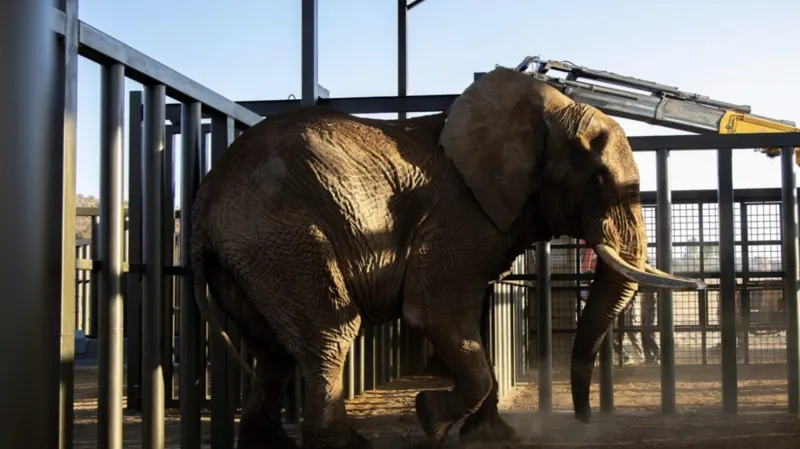South Africa’s last zoo elephant, Charlie, has been released back into the wild after 40 years in captivity.
Charlie was captured in 1984 from Zimbabwe’s Hwange National Park at the age of two. He was initially taken to Boswell Wilkie Circus in South Africa, where he was trained to perform tricks. In the early 2000s, he was moved to the country’s only national zoo.
In recent years, animal welfare groups had been advocating for Charlie’s release due to concerns about his health.
On Tuesday, the EMS Foundation, which works to protect wildlife rights, announced that after a “nail-biting four-hour trip to freedom,” Charlie had arrived at his new home at the Shambala Private Reserve in Limpopo province.
It said the “historic event” followed years of negotiation with the South African government, after EMS Foundation and its partners provided scientific evidence to show that elephants suffer in zoos.
At the zoo, Charlie the elephant is said to have witnessed the death of four other elephants, including his own calf which was less than a month old.
In 2019, concerns were raised that the elephant was showing signs of distress common with animals in captivity.
The South African National Biodiversity Institute, which runs the zoo, denied it, saying it was behaviour learnt from years of circus life that would never be completely unlearned. EMS Foundation said this was “inaccurate”.
On Tuesday, animal welfare organisation Four Paws, which collaborated with EMS Foundation, said the elephant’s “retirement was an important milestone for elephant Charlie but also for better animal welfare in South Africa”.
“Together with our partners, we have been working tirelessly to end the loneliness of Charlie to see him thrive in his new species appropriate home,” said Josef Pfabigan, Four Paws chief executive.
The elephant’s new home is a 10,000-hectare reserve with a thriving population of elephants, known to successfully reintegrate animals back into the wild.
While there, Charlie will be closely monitored by veterinary and behavioural experts.
“Our dream is that at his own pace, Charlie will learn to be the elephant he was always meant to be, and that soon, he will meet up and integrate into the existing elephant community on Shambala,” EMS Foundation said.
South Africa is home to a wild elephant population exceeding 25,000, according to the South African National Parks authority (SANParks).
African elephants face significant threats from poachers, who illegally kill thousands each year for their tusks. Additionally, habitat loss due to expanding human settlements poses a major challenge to their survival.


